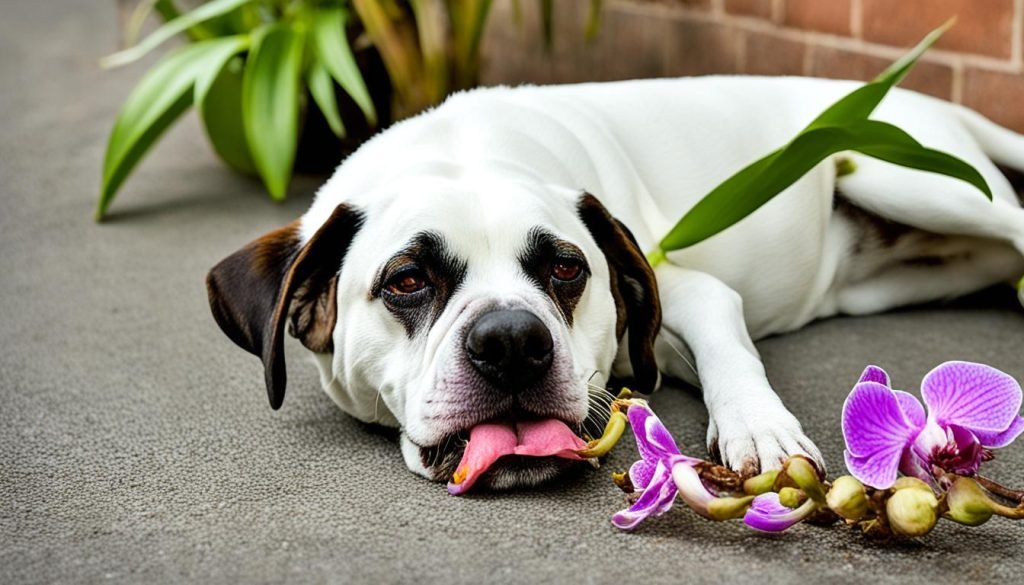In the pursuit of cultivating a pet-friendly haven within your home, where approximately 67% of U.S. households embrace the company of a cherished four-legged friend, it’s crucial to address concerns about pet safety. Dogs, known for their loyal companionship, warrant special attention when it comes to potential hazards. If you’ve ever pondered the question, “Are orchids harmful to dogs?” rest assured that the good news prevails – orchids are not considered harmful to dogs.
Organizations dedicated to animal welfare, such as the American Society for the Prevention of Cruelty to Animals (ASPCA), affirm that members of the Orchidaceae family are indeed non-toxic to pets. This information should come as a relief if you enjoy having these elegant plants in your home but worry about your furry friend’s wellbeing.
While orchids themselves do not pose a significant threat, it’s essential to recognize that dogs are naturally curious creatures. Although these plants are safe around your pups, it’s still wise to keep them out of their reach. Doing so helps prevent any potential digestive discomfort since roughage from plants isn’t part of a typical canine diet.
Are Orchids Harmful to Dogs?
Understanding Orchids and Canine Compatibility
As a pet parent, you may often wonder about the plants you bring into your home and their impact on your furry family member. It’s pivotal to recognize which plants are safe in a household shared with canine companions to ensure their health and your peace of mind.

Defining Orchids Toxicity in Dogs
Some of your favorite household plants may pose hidden dangers, but that’s not the case with orchids. These exotic beauties are a cause for curiosity but not concern, as they are not harmful to dogs. The exotic allure of orchids can brighten up any space without the fear of toxicity, even if your pup decides to take a curious nibble.
Safety of Orchids: The ASPCA’s Stance
If you question, “Are orchids harmful to dogs?“, you’ll be relieved to know that the ASPCA’s stance on orchids is clear. They classify orchids as non-toxic to dogs, categorizing them among other pet-friendly flowers. The assurance provided by this reputable animal welfare organization enables you to adorn your home with various orchid species, worry-free.
Popular Non-Toxic Flowers for a Pet-Friendly Home
Besides orchids, you have a rainbow of options to create a pet-friendly garden paradise indoors. Here’s a list of vibrant, non-toxic flowers you can enjoy while keeping your pets safe:
- Gerbera Daisies – Festive and brightly colored, they can spark joy in any room.
- Sunflowers – Their towering beauty and sunny blooms bring a rustic charm.
- Petunias – With a variety of shades, they add a continuous pop of color.
- Celosia – Their unique texture and fiery colors add an interesting touch to your decor.
- Zinnias – These low-maintenance blooms add a cheerful feel to your space.
- Asters – Resembling miniature daisies, they bring a wildflower-esque vibe.
- Marigolds – Known for their rich golden hues, they are perfect for a splash of warmth.
Remember, choosing the right flowers not only elevates your home’s aesthetic but also ensures that your dog can roam and explore without any risk. With an array of beautiful and pet-friendly flowers to select from, creating a vibrant, safe living space is both simple and satisfying.
Are Orchids Harmful to Dogs?
As a dog owner, understanding the orchids toxicity in dogs is important when incorporating plants into your living space. The question “Can dogs eat orchids?” often arises among pet enthusiasts who enjoy the elegance of these flowers. It’s reassuring to know that various orchid species, such as the Phalaenopsis Orchid, are deemed non-toxic to dogs. This means that orchids, celebrated for their delicate beauty, can coexist safely with your canine friend.
While the risk of flower poisoning in dogs is low when it comes to orchids, there’s a caveat. If your dog consumes any part of an orchid, there’s a slight possibility of a mild gastrointestinal upset. This discomfort is largely attributable to external factors, such as the presence of pesticides or fertilizers, rather than the plant itself. Below is an outline emphasizing the safe relationship between dogs and orchids:
- Phalaenopsis Orchid and other varieties – Non-Toxic for Dogs
- External factors like pesticides – Potential for Mild Upset
- Keeping orchids away from pets to prevent ingestion
- Signs of discomfort – If any signs arise, consulting a veterinarian is wise
Overall, your beloved pets and your cherished orchids can harmoniously share your home. By staying informed about orchids toxicity in dogs and taking simple precautions, you can ensure a pet-friendly environment that nurtures both your dog’s health and your horticultural passion. Enjoy the best of both worlds without any worry!
Identifying Non-Toxic Plants for Your Canine Friend
As a pet owner, creating a vibrant and lively space that’s also safe for your dog requires a bit of research and awareness. While it’s crucial to be wary of toxic plants for dogs, you’ll be delighted to discover a variety of non-toxic, pet-friendly flowers and plants that can beautify your home without posing any risks to your four-legged companion.

Recognizing Safe Plants for Dogs and Their Benefits
Did you know that some plants can indeed have a positive impact on both you and your pet? Certain safe plants for dogs not only add aesthetic value but also offer benefits such as improving air quality and enhancing mood. It’s about choosing wisely and ensuring the greens you bring into your home cater to the well-being of all family members, including pets.
Artificial Fake Bamboo Plant with Plastic Planter Pot, 39.4"
$39.88 in stock
Pet-Friendly Flowers That Won’t Endanger Your Dog
In your search for the perfect floral addition, consider options that are known to be non-toxic to dogs. Sprucing up your garden or home with colorful blooms like Petunias, Sunflowers, and Gerbera Daisies will allow your pet to frolic safely, while you enjoy the splashes of color they bring.
Alternative Options: Artificial Plants for Ultimate Safety
If you’re still concerned about the slight chance of mishaps with live plants, turning to artificial plants could be your best bet. They provide the look and feel of natural greenery without any of the worries or maintenance, giving you peace of mind and an evergreen environment.
Fopamtri Fake Majesty Palm Plant 3 Feet Artificial Majestic Palm
5 used from $26.91
Below is a helpful table summarizing some of the best safe plants for dogs you might consider introducing to your home:
| Plant Type | Description | Benefits |
|---|---|---|
| Petunia | Vibrant trumpet-shaped flowers | Easy to care for and available in various colors |
| Sunflower | Large, bold blooms that track the sun | Adds height and a sunny aesthetic to your garden |
| Gerbera Daisy | Vividly colored daisy-like flowers | Effective at purifying the air and brightening up spaces |
| Artificial Plants | Imitation plants that look like the real thing | No risk of toxicity or need for maintenance |
Remember, the bond with your pet is precious, and so is their health. Always ensure any new plant addition to your home is checked against a reliable source for its safety profile. By doing this, you contribute to a secure and enjoyable environment for your dog to thrive in.

Common Symptoms of Plant Poisoning in Dogs
As a dog owner, understanding the symptoms of orchid poisoning in dogs and toxic plants for dogs is crucial. Orchids, while non-toxic, share similar symptoms with other harmful plants when it comes to canine ingestion. Recognizing these indicators can save your pet from a lot of discomfort or even more severe health issues. Here are some common plant poisoning symptoms in dogs that you should watch out for:
- Vomiting
- Drooling
- Lethargy
- Loss of appetite
- Changes in urination or thirst
More serious symptoms may include:
- Depression
- Nosebleeds
- Bloody stools
If you notice any of these symptoms and they persist for more than 24 hours, please seek veterinary assistance. It’s always better to be safe and get your furry friend checked out.

| Symptom | Mild Reaction | Severe Reaction |
|---|---|---|
| Gastrointestinal | Vomiting, drooling | Bloody stools, repeated vomiting |
| Behavioral | Lethargy, loss of appetite | Depression, extreme lethargy |
| Physical | Changes in urination | Nosebleeds, abnormal thirst |
Creating a Dog-Safe Environment with Orchids
As the guardian of a furry friend, ensuring their safety is a prime concern, particularly when it involves household plants like orchids. Integrating canine companions into a home where orchids are part of the décor requires thoughtful strategies to keep both safe. By dog-proofing plants, employing training techniques, and choosing safe locations, you can maintain a pet-friendly space that is both aesthetically pleasing and secure for your dog.
Strategies for Keeping Dogs Away From Plants
One effective way to keep dogs safe around plants is to place orchids out of their reach. This could mean elevating potted plants onto high shelves or using hanging baskets. Additionally, creating barriers such as small indoor fences or plant stands can deter curious canines. It’s also wise to apply natural repellents like cinnamon powder or citrus scents around your plants, as dogs generally avoid these smells.

Choosing the Right Location for Your Orchids
Selecting the ideal spot for your orchids not only contributes to the plants’ health but also to your dog’s safety. Look for areas that are bright and airy to cater to the orchids’ needs, yet out of the path of wagging tails and inquisitive noses. Good spots might include a well-lit room, on a secure shelf, or even behind a decorative gate that allows for the beauty of the flowers to be admired from a safe distance.
Training Your Dog to Avoid Harmful Plants
While keeping your orchids secure, training dogs plant safety is just as crucial. Consistent commands such as “Leave it” can be taught to discourage them from approaching your plants. Reward-based training, where good behavior around plants is rewarded with treats or praise, encourages your dog to stay away from areas that are off-limits. Remember, training should always be done with patience and positive reinforcement, ensuring a happy and obedient pooch.
Creating a living environment that caters to the well-being of both your orchids and your pets calls for mindful decisions and actions. With the right approach, you can enjoy the tranquility of a plant-filled home without compromising the safety of your beloved dog.
Recognizing and Managing Mild Reactions
As a pet owner, understanding your dog’s health and well-being is paramount. While orchids are generally safe and non-toxic to dogs, they can sometimes cause unexpected mild reactions that should not be ignored. Knowing when these symptoms warrant consulting a veterinarian can make a significant difference in the care of your furry friend.

When to Consult a Veterinarian
If you notice symptoms of orchid poisoning in dogs, such as vomiting, diarrhea, or any change in their normal behavior after they have ingested orchids or other plants, it’s prudent to consult a veterinarian for your dog. These symptoms could be a sign of gastrointestinal upset in dogs—a common reaction to eating something out of the ordinary for their diet.
Understanding Gastrointestinal Upset in Dogs After Ingesting Plants
When our canine companions consume plants, even non-toxic ones like orchids, it can lead to a gastrointestinal upset. It’s critical to monitor their condition closely. Although orchids are not inherently poisonous, any plant matter foreign to a dog’s digestion can cause mild discomfort or intestinal irritation.
How to Monitor Your Dog for Allergic Reactions
Furthermore to gastrointestinal symptoms, it’s also vital to watch for any signs of allergic reactions. Be vigilant for symptoms such as skin rashes, itching, or difficulty breathing. If such reactions occur, seek veterinary advice as soon as possible to ensure the health and comfort of your pet.

Practical Tips for Orchid Care in a Household with Dogs
Orchid enthusiasts and dog lovers can harmonize their passions with ease. With some careful planning and adherence to proper orchid maintenance, you can enjoy the delicate beauty of these plants whilst ensuring a pet-friendly home. Let’s explore how to care for orchids with dogs present, prioritize a safe potting mix for pets, and manage the growing conditions of these elegant flowers.
Best Practices for Watering Your Orchids
The key to thriving orchids lies in their watering routine. Use pure, distilled, or rainwater to maintain the health of the plant without adding unwanted chemicals often found in tap water. Wait for the top inch of the soil to dry out before watering again, as overwatering can lead to root rot and fungal infections. Overhydration can also attract curious dogs with the excess water, so it is crucial to imbibe restraint with your watering can.
Novelty 30413 2 Gallon Deluxe Watering Can, Green
$16.16 in stock
Choosing the Safest Potting Mix for Your Pets and Plants
When selecting a potting mix, the safety of your four-legged companions should be top of mind. Opt for organic potting mixtures that are free from harmful chemicals and pesticides, thus ensuring it’s a safe potting mix for pets in the event of accidental ingestion. Some potting soils are specifically designed to be non-toxic to animals, providing a worry-free growing medium for orchid care.
Ensuring Proper Light and Temperature for Orchids
Orchids require just the right amount of indirect sunlight and stable temperatures to flourish. Place your orchids in a spot where they can bask in gentle, filtered light, and make sure the ambient temperature lies comfortably between 65 and 80°F. Avoid drafty windows or vents that can stress the plant, and remember, a comfortable orchid is less likely to shed leaves or pose a curiosity to your pet.
Agri-Pro Veterinary Thermometer. Fast, Accurate Temperature Readings
For your convenience, here is a quick reference table to ensure you’re on the right track for caring for orchids in a dog-inclusive environment:
| Orchid Care Aspect | Best Practice | Importance |
|---|---|---|
| Watering | Use distilled/rainwater; water when top inch of soil is dry | Prevents root rot and accidental overwater spillage, which might interest dogs |
| Potting Mix | Choose organic, chemical-free mixtures | Keeps pets safe from toxic substances if ingested |
| Light and Temperature | Maintain indirect light and stable temperatures (65-80°F) | Ensures healthy plant growth and minimizes falling debris to deter pet curiosity |
In brief, with the right approach to orchid maintenance, your living space can be a serene haven ornamented with the exotic allure of orchids while remaining safe and welcoming for your treasured dogs. Implement these practices today, and cultivate a serene, floral oasis for all your household’s inhabitants to enjoy.

The Truth About Other ‘Toxic’ Plants and Misconceptions
As a devoted dog owner, understanding pet plant safety is paramount in maintaining a healthy and happy environment for your furry friend. It turns out that many plants you’ve thought were harmful may actually fall into the category of common misconceptions about toxic plants for dogs.
While it is true that certain plants, such as Lilies and Azaleas, can cause serious health issues for your pet, some plants are often falsely accused of being poisonous. One such example is the Phalaenopsis Orchids, commonly mistaken as dangerous when they are in fact safe for canine companions.
This mix-up is why it’s essential to distinguish the actual toxic plants for dogs from those surrounded by myths. To help clear the air, let’s delve into the facts and shed light on several plants so that you can foster a safe haven for your dog to call home.
- Lilies: Truly toxic, can cause kidney failure in dogs.
- Azaleas: Ingestion can lead to vomiting, diarrhea, and a host of other symptoms.
- Phalaenopsis Orchids: These beautiful blooms are non-toxic and safe for dogs.
- Pothos: Often confused, but they can cause irritation in the mouth and GI tract.
It’s understandable to worry about your dog’s safety, though it’s crucial to not let misinformation lead to undue stress. Instead, rely solely on reputable sources like the ASPCA when selecting plants for your home. And remember, even non-toxic plants can sometimes cause mild discomfort if ingested, so it’s best to place them out of your dog’s reach.
In doing so, you’ll ensure that your living space remains an oasis of well-being, where you and your dog can both enjoy the lush splendor of plant life without any concerns.

Dispelling Myths: Orchids, Dogs, and Known Risks
As pet owners, it’s natural to be concerned about the plants you bring into your home. It’s time to separate fact from fiction and debunk the myths of orchid toxicity, focusing on real risks and educating on plant safety for the well-being of your furry friends.
Addressing Common Fears Among Pet Owners
Many pet owners harbor understandable worries about the potential risks household plants may pose to their dogs. While some plants are indeed dangerous, the myth that orchids fall into this category is simply not true. Oncidium, Phalaenopsis, and various other orchid species are entirely safe for dogs, allowing you to enjoy the elegance they bring to your living space without concern.
Factual Evidence Versus Rumor: The Real Dangers to Dogs
The real dangers to dogs often lie in other, less obvious places. Many plants and substances commonly found both indoors and outdoors can be harmful to your pet. It’s crucial to recognize the actual threats to ensure that you are not misled by rumors when it comes to your dog’s health.

Educating Yourself and Others on Plant Safety
To truly provide a safe environment for your dog, educating yourself on plant safety is vital. Not only is this knowledge crucial for your peace of mind, but sharing it with other pet owners can help create a wider safety net for pets everywhere.
| Plant | Level of Toxicity | Common Side Effects in Dogs |
|---|---|---|
| Oncidium Orchids | Non-toxic | N/A – Safe for pets |
| Phalaenopsis Orchids | Non-toxic | N/A – Safe for pets |
| Lilies | Highly toxic | Kidney failure, lethargy, vomiting |
| Azaleas | Highly toxic | Digestive issues, cardiac failure, weakness |
| Poinsettias | Mildly toxic | Upset stomach, skin irritation |
By recognizing the known risks to dogs and debunking the myths about orchids, you empower yourself to make informed decisions about the foliage you adorn your home with. Stay informed and ensure not just the beauty but the safety of your pet-friendly paradise.
Final Remarks
As a pet owner, you naturally desire a living space that radiates beauty while ensuring the safety of your beloved dogs. The road to achieving this balance is paved with informed choices and practical steps that foster a happy pet home. Orchids offer a diverse palette of colors and shapes to enhance your decor and, thankfully, they harmonize wonderfully with your four-legged friends. By implementing the guidance outlined throughout this article, you create a serene environment where plants and pets can coexist peacefully.

Join Our GeoZoo Family
Subscribe to our Newsletter
Creating Harmony Between Your Orchids and Four-Legged Friends
The key to dogs and orchids harmony lies in understanding and adjusting. Knowledge of which orchids and other plants are non-toxic to dogs is indispensable. It allows you to enjoy the luscious allure of orchids without worrying about the wellbeing of your curious canine companions. Keep in mind the placement of your plants, the use of pet-friendly potting mix, and the importance of keeping potentially harmful substances out of reach to maintain this balance.
Staying Informed: Key to a Safe and Happy Pet Home
Your ongoing commitment to staying informed about pet safety is crucial. It keeps your home’s environment safe for everyone. The American Society for the Prevention of Cruelty to Animals (ASPCA) and other reputable sources provide valuable insights into pet-friendly practices. Keeping abreast of the latest information not only ensures your dog’s safety but also enriches your experience as a responsible plant and pet owner. Therefore, continue to educate yourself and enjoy the dual delights of canine companionship and botanical beauty in your loving home.
FAQ
Are orchids harmful to dogs?
Can dogs eat orchids without getting sick?
What are some symptoms of plant poisoning in dogs?
What should I do if my dog ingests a part of an orchid plant?
Which flowers are considered safe for a pet-friendly home?
How can I create a safe environment for my dogs with orchids present?
What are the best practices for watering orchids in a household with dogs?
Are there any toxic plants that should be avoided in households with dogs?
How can I ensure proper light and temperature for my orchids around my dogs?
What common misconceptions exist about orchids and dogs?
Meet Jake Harrington, your go-to guru for all things canine. With over 15 years of professional dog training experience, Jake has transformed the lives of thousands of dogs and their owners. His journey began in the bustling streets of a major city, where he discovered his natural affinity for understanding canine behaviors and communication.






